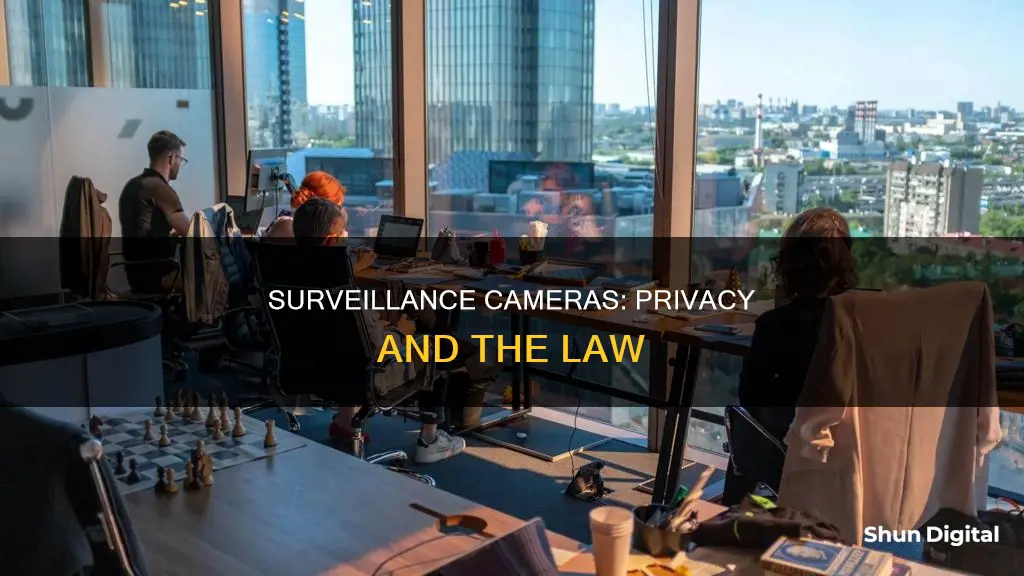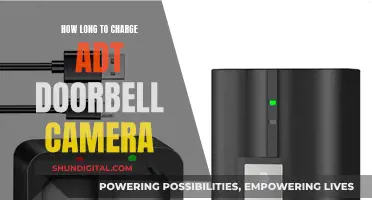
Surveillance cameras with audio capabilities are commonplace, but their use is subject to certain laws and regulations. The legality of recording audio varies depending on the location and the specific circumstances. In the United States, federal law permits recording with the consent of at least one party involved in the conversation. However, some states have stricter requirements, such as California, Connecticut, Delaware, Florida, and Illinois, which mandate the consent of all parties. It is generally illegal to record audio in private spaces without the knowledge or permission of the individuals being recorded. Additionally, recording in areas with a reasonable expectation of privacy, such as bathrooms or bedrooms, is prohibited. The laws surrounding audio surveillance aim to protect the privacy rights of individuals, ensuring that conversations are not secretly recorded without their consent.
| Characteristics | Values |
|---|---|
| Legality | Depends on the state and country |
| Federal laws | The Wiretap Act, the Electronic Communications Privacy Act (ECPA), the Foreign Intelligence Surveillance Act (FISA), the USA Patriot Act, the Communications Assistance for Law Enforcement Act (CALEA), the Federal Intelligence Surveillance Act Amendments Act, and the Fourth Amendment of the Constitution |
| State laws | One-party consent, two-party consent, privacy laws |
| Places | Public places, private places, bedrooms, bathrooms, dressing rooms |
| Consent | Must be obtained from at least one party, preferably all parties |
| Signs | Recommended, required in certain areas |
| Punishment | Fines, imprisonment |
What You'll Learn

Consent laws
The legality of surveillance cameras with audio recording capabilities varies depending on location and context. While there is no specific federal law in the US that regulates the use of home security cameras, there are national consent and privacy laws that apply to video and audio surveillance.
However, the one-party consent law does not cover video surveillance. If a security camera records audio as well as video, the one-party consent law should be considered, as the audio aspect falls under this regulation.
It is important to note that consent laws vary at the state level, and some states have stricter requirements. As of 2022, 11 states require two-party consent, meaning that everyone involved must know the conversation is being recorded. These states include California, Delaware, Florida, Illinois, and Maryland, among others.
Other Considerations
In addition to consent laws, there are other factors to consider when using surveillance cameras with audio capabilities. For example, in private areas like bedrooms, bathrooms, or dressing rooms, recording of any kind without the person's knowledge is illegal and violates eavesdropping laws.
Furthermore, while hidden cameras are generally allowed, there may be restrictions depending on the state and local regulations. It is crucial to research and understand the specific laws and regulations in your area before installing and using surveillance cameras with audio capabilities.
Alone Contestants' Camera Battery Charging Strategies
You may want to see also

Privacy laws
Federal Privacy Laws
Several federal laws govern the use of surveillance, including the Electronic Communications Privacy Act (ECPA) of 1986, the Foreign Intelligence Surveillance Act (FISA) of 1978, the USA Patriot Act of 2001, the Communications Assistance for Law Enforcement Act (CALEA) of 1994, and the Federal Intelligence Surveillance Act Amendments Act of 2008 (FISA Amendments Act).
Additionally, the Fourth Amendment of the Constitution safeguards individuals' privacy rights by regulating how government agents may surveil their electronic devices.
State and Local Privacy Laws
State regulations generally protect people's reasonable expectation of privacy. However, each state has its own rules, and some states have stricter security camera laws than what's permitted federally. Currently, 15 states have specific security camera laws, and only 11 of these states require two-party consent for audio recording. The remaining states follow the one-party consent rule, which allows recording as long as one party consents.
Some states also have unique provisions. For example, California prohibits the recording of confidential communications, while Georgia requires cameras to be in plain sight.
Privacy in Public vs. Private Spaces
On the other hand, private spaces like bedrooms, bathrooms, or dressing rooms are considered off-limits for recording without the individual's knowledge, as these areas fall under the "reasonable expectation of privacy."
Practical Considerations
Before installing security cameras, it is essential to understand the specific privacy laws and regulations in your state and local area. Consult with legal experts or refer to official government websites for detailed information on the applicable laws and how they may impact your specific situation.
Semi-Auto Mode Camera: Creative Control, Simplified
You may want to see also

Surveillance laws
Federal law and some states follow the one-party consent rule. Federal law 18 U.S.C. 2511(2)(d) permits recording phone calls or in-person conversations with the consent of at least one person involved. If you or another adult consented to the recording, you can keep using audio-equipped cameras.
Some states have more stringent requirements, such as the all-party consent rule. As of 2022, there are 11 states that require two-party consent when it comes to recording. The rest only require one-party consent.
One-party consent means that if you are part of a conversation, you are allowed to record it, whether or not the other person knows or consents. For the law to apply, you usually have to be present for the conversation as it is being recorded. If not, the other person must consent to being recorded.
Two-party consent means everyone involved must know the conversation is being recorded before it takes place. The following states require two-party consent: California, Delaware, Florida, Illinois, and Maryland, among others.
State regulations generally protect people's reasonable expectation of privacy. However, each state has its own rules, so it is essential to consult your jurisdiction for specific guidance.
In the United States, there are 15 states with specific laws around security cameras, but some counties and cities also have their own laws.
Marco Mode: Panasonic Camera's Secret Superpower
You may want to see also

Public vs private spaces
The legality of surveillance cameras with audio recording capabilities varies depending on whether they are being used in a public or private space.
Public Spaces
In public spaces, it is generally legal to record video and audio. However, there is an expectation of privacy in certain public spaces, such as public restrooms. In these spaces, recording audio or video is illegal. Additionally, covert recording in public spaces using hidden surveillance cameras is typically prohibited.
Private Spaces
In private spaces, such as homes, the use of surveillance cameras with audio recording capabilities is more restricted. It is generally recommended to keep cameras away from private areas such as bedrooms, guest rooms, and bathrooms. Recording in these areas without the knowledge of the person being recorded is illegal and violates eavesdropping laws. However, hidden cameras are generally allowed in common areas of a home, such as living rooms, as long as they abide by the expectation of privacy laws.
Consent Laws
It is important to note that both federal and state laws govern the use of surveillance cameras with audio recording capabilities. At the federal level, the one-party consent law allows recording a conversation with the consent of at least one person involved. However, some states have stricter all-party consent laws, which require the consent of all parties involved in the conversation. Therefore, it is essential to check the specific laws in your state or locality before installing surveillance cameras with audio recording capabilities.
Mastering Manual Focus with the Lumix 300FZ
You may want to see also

Audio vs video recording
The legality of audio and video recording differs in several ways. Firstly, the laws governing these types of recordings vary between federal and state levels. While federal law permits "one-party consent" for audio recordings, some states have stricter "all-party consent" laws. This means that while one person's consent is generally sufficient for recording conversations, certain states require the consent of all parties involved.
Secondly, the consequences for violating audio and video recording laws differ. Breaching audio surveillance laws can result in severe penalties, including substantial fines and imprisonment. On the other hand, video recordings are generally legal in public spaces, but prohibited in areas with a higher expectation of privacy, such as bathrooms and changing rooms. Violating video recording laws in these private areas can lead to legal consequences, but the specific penalties vary depending on the state.
Additionally, the interpretation of "expectation of privacy" differs between audio and video recordings. For audio recordings, federal law prohibits secret recordings of conversations where individuals have a reasonable expectation of privacy. In contrast, video recordings in public spaces are generally permitted, but there are nuances to this rule. For example, filming someone in a bathroom or dressing room, or attempting to film under someone's clothing, would be considered illegal and possibly constitute sexual harassment.
Furthermore, the technology used for audio and video recording is distinct. Audio recording laws specifically refer to the use of devices such as microphones and hidden cameras with audio capabilities. These laws govern the use of such equipment and are separate from the consent requirements for audio recordings.
Lastly, the purpose of the recordings can impact their legality. For instance, workplace monitoring is permitted if there is a legitimate business interest and explicit consent policies are in place. Similarly, recordings may be allowed in exigent circumstances, such as threats to life or property, and for national security and public safety reasons.
In summary, while both audio and video recordings have legal considerations, the specifics of these considerations differ due to the nature of the recordings, the applicable laws, the consequences of violations, the interpretation of privacy, the technology involved, and the purpose of the recordings.
Unlocking Macro Photography: Mastering Camera's Macro Focus
You may want to see also
Frequently asked questions
No, it is not illegal to have security cameras with audio. However, in many states, it is illegal to record someone without their consent, especially when they are indoors.
It is advised to keep cameras away from bedrooms, guest rooms, and bathrooms. You can place cameras in common areas, such as the living room. For outdoor cameras, it is recommended to keep them focused on your own property and/or public property.
Yes, you need the consent of at least one party involved in the conversation to record audio legally. This is called the one-party consent rule. Some states have an all-party consent rule, which means all parties in the conversation must give consent.
You do not need to display signs if you have security cameras in your home. However, it is recommended to do so as it can help deter burglars and politely inform neighbours when their property is being recorded.







